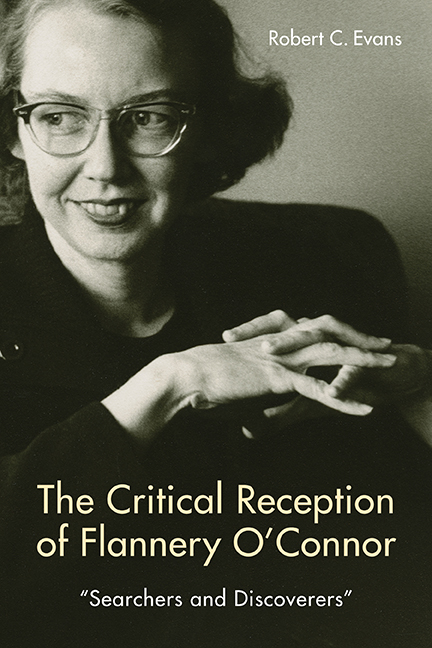Book contents
- Frontmatter
- Dedication
- Epigraph
- Contents
- Acknowledgments
- Introduction
- 1 Aesthetics: Style, Form, Themes, and Characterization
- 2 Religion: Christianity and Catholicism
- 3 History and Historical Contexts
- 4 The South: Heritage and Change
- 5 Race: Blacks and Whites
- 6 Gender: Women and Men
- Conclusion: O'Connor Criticism: What Now? What Next?
- Works Cited
- Index
1 - Aesthetics: Style, Form, Themes, and Characterization
Published online by Cambridge University Press: 15 August 2018
- Frontmatter
- Dedication
- Epigraph
- Contents
- Acknowledgments
- Introduction
- 1 Aesthetics: Style, Form, Themes, and Characterization
- 2 Religion: Christianity and Catholicism
- 3 History and Historical Contexts
- 4 The South: Heritage and Change
- 5 Race: Blacks and Whites
- 6 Gender: Women and Men
- Conclusion: O'Connor Criticism: What Now? What Next?
- Works Cited
- Index
Summary
FLANNERY O'CONNOR always contended that her work's value depended far less on its messages or meanings than on its artistry. A text had to succeed—first and foremost—as art before it could successfully affect a reader emotionally or intellectually. Badly written work, she felt, was not worth reading, no matter how virtuous or well-intentioned its “meaning.” Despite her own very strong Christianity (particularly her Catholicism), O'Connor disdained anything merely pious or drippingly saccharine, flaws she found in much “serious” religious writing of her time and flaws she deliberately opposed in her own style and methods. Ideas and sentiments alone, she believed, no matter how admirable, could not make “creative writing” real art. The true Christian artist, O'Connor thought, had to be an artist first and foremost, not a mere religious propagandist. Too many Christian writers, she believed, were, indeed, simple religious partisans, and O'Connor thought obvious religious dogma, tricked up in ineptly written works, did more harm than good. Unskilled “Christian literature,” in her opinion, was not only mocked by real artists but also corrupted the tastes of Christian readers.
These views are hardly surprising: after all, O'Connor was learning her craft just when the so-called New Criticism began to dominate thought about creative writing. While working on her MFA, she owned a thoroughly marked-up copy of one bible of the New Criticism: Understanding Fiction, by Cleanth Brooks and Robert Penn Warren. This extraordinarily influential book followed the even more influential Understanding Poetry, also by Brooks and Warren. The New Critics (or “formalists”) believed that every word mattered, as did its precise placement in a carefully designed whole. O'Connor was a committed formalist. This fact hardly explains everything about her art, but it does explain much. Some of her best friends, best teachers, and staunchest advocates were not only New Critics but leading New Critics. These included Allen Tate and his wife, Caroline Gordon. Through them and such others as Andrew Lytle and John Crowe Ransom, O'Connor quickly became a member in very good standing in formalist circles. She valued the opinions of such people, and they valued her art.
- Type
- Chapter
- Information
- The Critical Reception of Flannery O'Connor, 1952–2017“Searchers and Discoverers”, pp. 4 - 113Publisher: Boydell & BrewerPrint publication year: 2018



